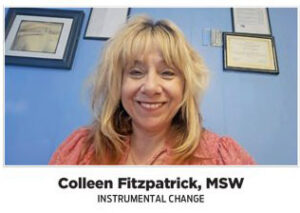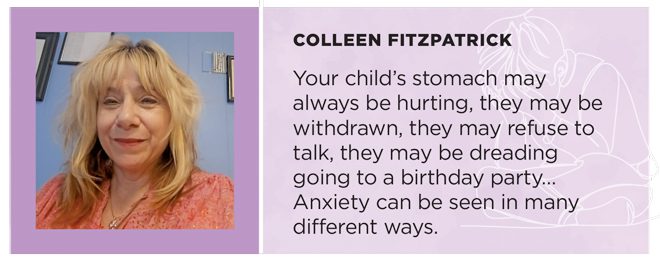Roundtable: Kids’ Mental Health 2024

Colleen Brigid Fitzpatrick
MSW, LCSW
 Colleen Fitzpatrick discusses the lasting effects of COVID-19 on children's mental health, highlighting the anxiety and developmental issues caused by the pandemic. She describes signs of anxiety in children, such as fidgeting, stomachaches, and withdrawal. Regarding anorexia, she warns about changes in eating patterns and the influence of social media on mental health. Fitzpatrick emphasizes the importance of therapy and a parent's supportive role in a child's mental health journey.
Colleen Fitzpatrick discusses the lasting effects of COVID-19 on children's mental health, highlighting the anxiety and developmental issues caused by the pandemic. She describes signs of anxiety in children, such as fidgeting, stomachaches, and withdrawal. Regarding anorexia, she warns about changes in eating patterns and the influence of social media on mental health. Fitzpatrick emphasizes the importance of therapy and a parent's supportive role in a child's mental health journey.
Lasting effects of Covid…
"The effects of Covid on children’s mental health has been catastrophic – at every age. Think about it: 3-year-olds were seeing people but not their face, they only saw a mask. And teenagers were saying, “Wait, I could die from this?” Can you imagine the anxiety that caused? If you were 2 years old when Covid hit, that’s two years of developmental milestones that you missed. We were all living day by day, minute by minute, in a very fear-based world."
Recognizing Anxiety in your child…
"Anxiety is ongoing, and it comes across in many ways, not just physically, but also emotionally. Your child’s stomach may always be hurting, they may be withdrawn, they may refuse to talk, they may be dreading going to a birthday party. Another lesser known sign is fidgeting. Anxiety can be pulling on your hair, it can be twisting your hair, it can be pulling out your eyebrows, resistance to something new. Anxiety can be seen in many different ways."

Anorexia…
"A lot of times, it’s done in secret so you have to be a detective. Look for changes in behavior or a severe restriction of calories. Another big clue is if you see diet apps on their phone or apps that count calories. And watch what you say. I’ve had many young girls and boys say to me, “Everybody told me this is the best I’ve ever looked.” And they weighed 90 pounds."
Coping with divorce…
"With little ones, you’ll notice separation anxiety, possibly regression in behaviors, like bedwetting. With kids in grade school, they’ll ask tons of questions, like “What happened?” Teenagers wonder whose fault it was, and why can’t my parents just work it out? But it comes down to how mom and dad treat each other. If mom and dad aren’t treating each other with respect, the child is not going to respond very well."
Managing grief…
"When you’re talking with a younger child, be direct with language and say the person has died. Don’t say the person has passed. When we use the word pass, they will think of a car passing by."
Social media & kids’ mental health…
"There are some good things about social media, and some not so good. We have wonderful apps, such as Calm, for people who have self-injurious behavior. It’s phenomenal and has been shown to help so many people. The other thing is people don’t feel alone. They have that sense of joining a community. The not-so-good things are some of the apps can go to a very dark place and give children ideas that wouldn’t really be in their head. And bullying has become a huge part of social media."
Finding a therapist for your child…
"Ask friends and family and look at reviews online. People tell the truth on Google reviews. 99% of therapy is getting along with and respecting your therapist. Children need to look forward to coming to therapy. They need to have a warm, welcoming place in a safe environment."
A parent’s role in their child’s therapy…
"At the first session, I spend time with the parent and child and talk about goals. I always ask the child, whether they’re 3 or 16, if they’re comfortable for the two of us to meet by ourselves. If it’s a no, then it’s a no. They set that rule. One thing I want to emphasize is your child has to want to be here."
Is there still a stigma about therapy…
"It’s completely more acceptable. It is phenomenal how they’re using stress reduction techniques like yoga in schools with little ones. We’re finally acknowledging that school can be a huge stressor for them. Everyone is much more aware of children’s mental health needs, whether it be in school, with family or friends, at camp, in just every aspect."
How a parent can help…
"At the core of this is your relationship with your child. Spend time with them and talk to them. Be observant. When the time is right, approach them in a very gentle manner. Not like, “Why aren’t you going to the dance?!” Because they’re probably not going to the dance because they’re anxious. You could say, “How can we make this more enjoyable for you?” And, “Do you really not want to go?” I’m a big believer that children should have choices. If they don’t want to go, don’t make them go."

Colleen's diverse background can help you achieve long lasting results.
- Masters in Clinical Social Work
- Certificate in Business Communications
- Extensive Training and Certifications in Hypnosis, Studio Art and Neurologic Music Therapy
Post Graduate Training in:
-
- Group Dynamics
- Psychoanalysis
- Interpersonal Relationships
- Communication
- Delegation and Work/Life Balance


